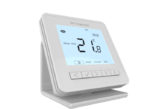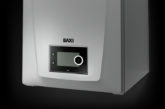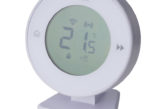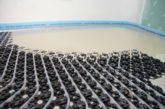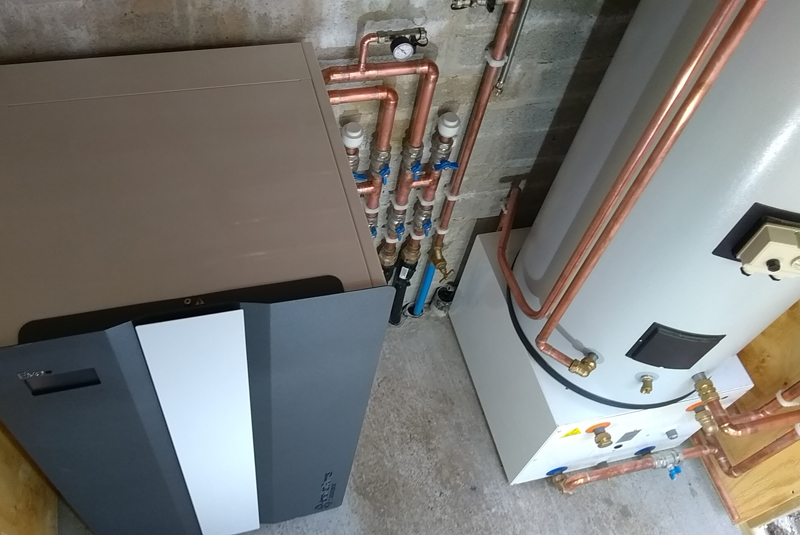
Using an inverter compressor with an air source heat pump system is almost a no-brainer because of the fluctuating source air temperature. However, Kensa Heat Pumps favours fixed speed compressors in its ground source units. Technical Director, Guy Cashmore, explains why.
What’s the difference between inverter driven and fixed speed compressors?
To better understand the benefits of fixed speed compressors in ground source heat pumps, you first need to understand the difference between the two.
The compressor component of a ground source heat pump is responsible for upgrading the low grade heat energy extracted from ground or water sources and upgrading this to a higher temperature for use within a building’s heating distribution system.
Inverter driven compressors are generally of a scroll-type, which change speed in response to the load or source temperature experienced by a heat pump unit. Fixed speed compressors run at one speed, which cannot be altered, and are either on or off.
Armed with this knowledge, let’s examine what we believe are some of the more commonly held misconceptions about inverter-driven compressors in ground source heat pump systems, and the demonstrable benefits of fixed speed compressors.
Are inverters more efficient because they have a lower electricity consumption?
It is true that by altering the speed of the compressor to match demand, an inverter can reduce the amount of electricity used by the ground source heat pump, and so they look like an attractive proposition to the energy conscious. However, whilst in certain limited circumstances this does produce higher efficiencies, heat output also reduces pro-rata.
Due to the way that ErP results are derived, and the fact that inverters can operate at part-load conditions, they can produce better results in test conditions. Kensa has found that fixed speed compressors may actually be more efficient in real-life scenarios, and some inverter driven ground source heat pumps are less efficient due to power losses in the inverter itself.
Do inverter driven ground source heat pumps perform better?
Based on the compressor rotations per minute (RPM), or speed, an inverter driven compressor has various limits that have to be respected in order to run the system safely. Whilst they are capable of fluctuating their speed according to demand, inverter compressors are still designed to run at, or as close as possible to, one optimum speed.
Any operation away from this speed will limit the maximum output temperature available and also compromise the efficiency. This ‘sweet spot’ of operation speed means that it is imperative that the inverter compressor is sized correctly by the installer for the heat demand – a ‘catch all’ approach does not work efficiently.
Fixed speed compressors are optimised for the best efficiency at the speed they are fixed to run. Therefore, if your ground source heat pump is sized to operate at a maximum output for the majority of its life, a fixed speed compressor may well prove more efficient than an inverter at the same speed.
Are inverter driven compressors more reliable than fixed speed?
Inverters of all types are well known for their reliability issues and have a relatively short working life. A ground source heat pump designed to last 25 years will typically need two replacement inverters in that time, and the cost of these alone is likely to exceed any savings made in running costs, based on efficiency projections. Availability of compatible replacement inverters is also questionable over this time period, as electronics of this type tend to only be available for around eight years.
Generally the fluctuating speed of rotation in inverters is controlled by sophisticated and expensive electronics, and whilst these are becoming more robust, they have a short life compared to fixed speed compressors. They are also vulnerable to damage from voltage spikes and nearby lightning that would not damage a fixed speed unit.
Refrigerant
Currently, almost all ground source heat pump compressors designed for use with an inverter are only compatible with R410A refrigerant. This refrigerant has a significantly higher Global Warming Potential (GWP) than the R134a that Kensa uses, and is already being viewed as ‘obsolete’ by many in the industry because of this.
Quite apart from the environmental considerations, future availability of this refrigerant for service is questionable. R410A operates at very high pressures, approximately double the pressure of R407C or R134a. This causes high levels of stress on components leading to reduced reliability in heat pumps using this type of refrigerant. R410A also has limited maximum hot water temperature, which can cause issues with DHW system; a typical R410A system will be limited to about 10° less than an R134a system.


